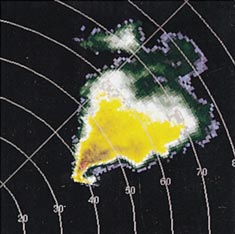
This Article From Issue
July-August 1999
Volume 87, Number 4
DOI: 10.1511/1999.30.0
Hook echo in a tornadic thunderstorm near Arcadia, Oklahoma, May 17, 1981, at 5:58 p.m. . . . A tornado formed a few minutes later. The shape of the yellow radar echo looks a bit like a scorpion or the tip of Cape Cod.
Tornado Alley: Monster Storms of the Great Plains
Howard Bluestein
Oxford University Press, $35
The value of weather maps is most apparent when a warning is ignored by someone who should know better. Someone like Hollis Blanchard, captain of the Portland, a 320-foot-long wooden side-wheel steamship that foundered in Massachusetts Bay, several miles west of Cape Cod, on Sunday morning, November 27, 1898, around 10 o’clock—the time frozen on the wristwatches strapped to bodies that washed ashore later that day.
Air Apparent: How Meteorologists Learned to Map,Predict, and Dramatize Weather
Mark Monmonier
University of Chicago Press, $27.50

From Tornado Alley: Monster Storms of the Great Plains.
American Scientist Comments and Discussion
To discuss our articles or comment on them, please share them and tag American Scientist on social media platforms. Here are links to our profiles on Twitter, Facebook, and LinkedIn.
If we re-share your post, we will moderate comments/discussion following our comments policy.